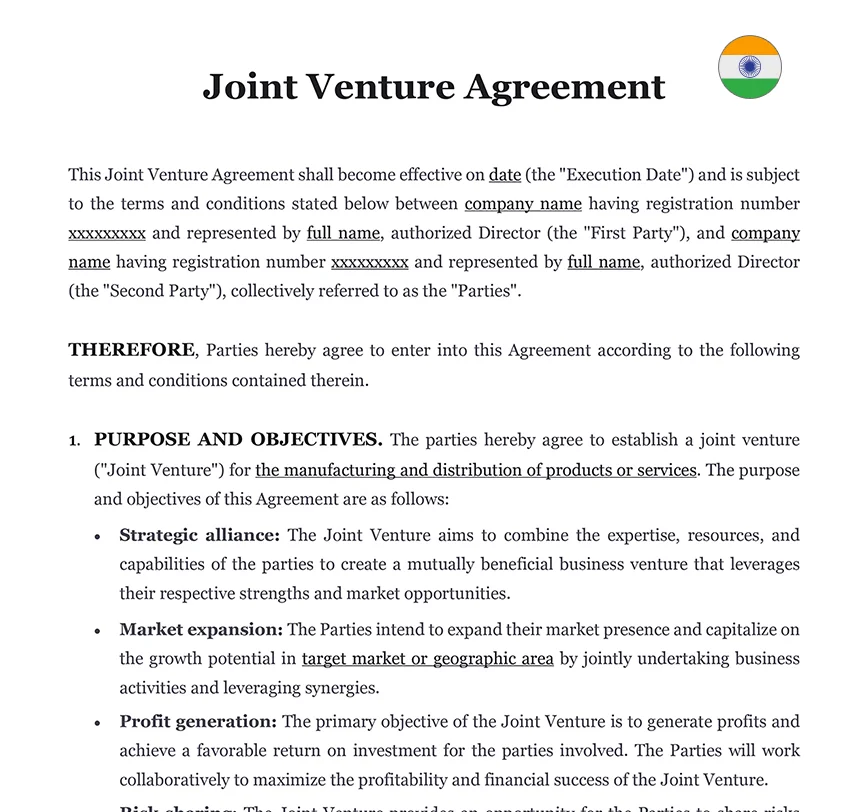Ready to use legal template
Drafted by experienced lawyers
Compliant with Indian law
Ready to use legal template
Drafted by lawyers
Compliant with Indian law
Home › Business contracts › Joint Venture Agreement
Learn more about Joint Venture Agreement in India
A Joint Venture Agreement is a legal document that establishes the terms and conditions for a business collaboration between two or more independent entities. It outlines the rights, obligations, and responsibilities of the parties involved in the joint venture, as well as the purpose and goals of the collaboration. A joint venture is formed when two or more businesses come together to undertake a specific project or engage in a particular business activity. Unlike a merger or acquisition where one company absorbs another, a joint venture allows separate entities to pool their resources, expertise, and capabilities for a defined period or purpose while maintaining their individual legal identities.
Table of contents
What is a Joint Venture Agreement (JVA)?
A Joint Venture Agreement (JVA) is a legal document that outlines the terms and conditions under which two or more parties agree to collaborate on a specific business project or venture. The agreement establishes the rights, responsibilities, and contributions of each party involved in the joint venture.
Key elements typically covered in a JVA include the purpose and scope of the joint venture, the capital contributions and resources each party will provide, the distribution of profits and losses, decision-making mechanisms, dispute resolution procedures, and the duration or termination conditions of the joint venture.
The JVA serves as a contract that governs the relationship between the parties, aiming to provide clarity and legal protection for all involved in the collaborative business endeavor.
What should a Joint Venture Agreement include?
A comprehensive Joint Venture Agreement (JVA) should include key provisions that define the terms and conditions of the collaboration between the parties involved. While specific details may vary based on the nature of the joint venture and the preferences of the parties, the following elements are commonly included in a JVA:
Identification of Parties: Clearly specify the legal names and details of the parties entering into the joint venture.
Purpose and Scope: Define the objectives, goals, and scope of the joint venture, outlining the specific business activities it aims to undertake.
Contributions: Detail the contributions that each party will make to the joint venture, including financial investments, resources, intellectual property, or other assets.
Ownership Structure: Specify the ownership structure and the percentage of ownership or interest that each party holds in the joint venture.
Management and Decision-Making: Outline the governance structure, decision-making processes, and management responsibilities within the joint venture.
Profits and Losses: Define how profits and losses will be allocated among the parties, including the distribution mechanism and frequency.
Intellectual Property: Address the ownership, usage, and protection of intellectual property developed or utilized during the joint venture.
Confidentiality: Include provisions to protect confidential information, outlining the responsibilities of each party regarding the handling of sensitive business information.
Duration and Termination: Specify the duration of the joint venture and the conditions under which it may be terminated, including any exit mechanisms.
Dispute Resolution: Establish procedures for resolving disputes between the parties, whether through negotiation, mediation, arbitration, or another agreed-upon method.
Regulatory Compliance: Address any legal or regulatory requirements applicable to the joint venture, ensuring compliance with relevant laws and permits.
Non-Compete and Non-Solicitation: Include clauses preventing parties from engaging in competing activities or soliciting employees or customers of the joint venture.
Insurance: Specify any insurance requirements or provisions to mitigate risks associated with the joint venture.
Financial Reporting: Detail the financial reporting requirements and mechanisms for sharing financial information between the parties.
Amendments: Include provisions for amending the agreement, outlining the process for making changes with the mutual consent of the parties.
How are profits and losses shared?
In a Joint Venture Agreement (JVA), the sharing of profits and losses is a crucial aspect determined through negotiation and specified in the agreement. Common approaches include equal sharing, proportional distribution based on ownership or contributions, preferred returns for certain parties, hurdle rates defining minimum thresholds, tiered distribution models, and carried interest arrangements. The chosen method should align with the goals and expectations of the parties, reflecting their contributions and financial stakes.
This aspect of the JVA ensures transparency, fairness, and alignment of interests among joint venture partners, with legal and financial professionals often consulted to ensure accuracy and legal soundness in reflecting the agreed-upon profit-sharing mechanism.
What contributions are expected from each party?
In a Joint Venture Agreement (JVA), the contributions expected from each party are clearly defined and outlined to establish the terms of their participation in the joint venture. These contributions can take various forms, including financial investments, resources, expertise, or other assets. The agreement specifies the nature and extent of each party’s commitment, detailing the responsibilities and obligations they undertake to achieve the joint venture’s objectives.
The contributions may be proportional to each party’s ownership stake or negotiated based on their unique roles and expertise. Clarity on contributions is essential for ensuring a fair and balanced partnership, aligning expectations, and facilitating the effective functioning of the joint venture.
Are there restrictions on competition?
Yes, Joint Venture Agreements (JVAs) commonly include restrictions on competition to protect the interests of the parties involved. These restrictions are designed to prevent participants from engaging in activities that directly compete with the joint venture during its duration and, in some cases, for a specified period after its termination.
Non-compete clauses typically outline the geographic scope, the specific activities prohibited, and the duration of the restriction. Such provisions are crucial for safeguarding the joint venture’s business, preserving its market share, and ensuring that participants remain committed to the collaboration without diverting resources or efforts into competitive ventures. The inclusion and terms of non-compete clauses are subject to negotiation and are often tailored to the specific circumstances of the joint venture.
How is confidential information handled?
Joint Venture Agreements (JVAs) address the handling of confidential information by incorporating provisions that define the scope of confidential data, outline the obligations of each party to maintain confidentiality, and specify exceptions or permitted disclosures. These provisions typically detail the duration of confidentiality, security measures to safeguard information, procedures for the return or destruction of data after the joint venture’s conclusion, and non-use clauses preventing the exploitation of confidential information for personal gain. The inclusion of indemnification provisions holds parties accountable for breaches, fostering trust among joint venture partners and ensuring the protection of intellectual and proprietary assets.
Joint Venture AgreementTemplate (.docx)
Save on attorney fees
310 client reviews (4.8/5) ⭐⭐⭐⭐⭐
Share information
Why Themis Partner ?
Make documents forhundreds of purposes
Hundreds of documents
Instant access to our entire library of documents for India.
24/7 legal support
Free legal advice from our network of qualified lawyers.
Easily customized
Editable Word documents, unlimited revisions and copies.
Legal and Reliable
Documents written by lawyers that you can use with confidence.




